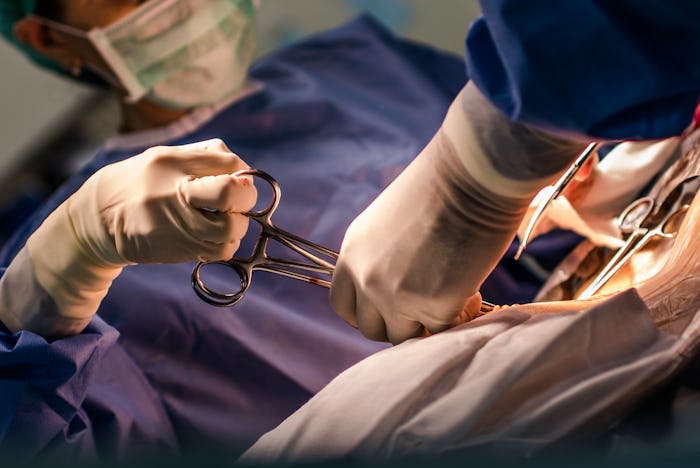Life

Here's *Exactly* How A C-Section Will Change Your Stomach, According To Experts
The postpartum stomach is as wondrous as it is debated. For the most part, it's the area doing all the growing during those 40 weeks (more or less) of pregnancy, and it's somehow capable of shrinking back to it's pre-pregnancy size once you give birth. One thing that can impact how your body handles postpartum life is the kind of birth you have. So if you're scheduled for a C-section, or you've just had one, you might be wondering how having a C-section affects your stomach later in life. Turns out, science and a few birth experts have the answer.
Since a C-section involves cutting through your abdomen to lift the baby out of your stomach, according to the American Pregnancy Association (APA), it stands to reason that your stomach would have some recovering to do, both in the short- and long-term. That is definitely the case, although for each woman who undergoes a C-section, the route to recovery may look a little different.
When it comes to short term recovery from a C-section, BabyCenter explains that you'll probably be in slightly more pain from a C-section than you would if you were to experience a vaginal birth. The site continues to highlight the differences, saying:
"You'll probably feel pain in your wound for the first few days and discomfort in your tummy for at least the first week or so after the operation, while your body heals. A caesarean may affect your day-to-day activities for some time. About one in ten women have abdominal discomfort that lasts for a few months after the surgery."
CNN reports that while a C-section carries similar risks to any major surgery, such as excessive bleeding, blood clots or infection, one of the particular concerns focuses on adhesions, where bands of scar tissue connect together and can make your organs stick to each other. Adhesion can affect organ function, according to Harvard Health, as well as fertility if your reproductive organs are the organs negatively affected. Surgery is necessary to correct adhesions and free your organs from the scar tissue, according to WebMD.
In the long term, your incision site might bother you for up to six months. Fit Pregnancy explains, saying:
"It takes many months for inflamed nerve endings and other tissues to heal... The area around your incision may also be numb for six months or longer."
Meanwhile, an Australian study reported in the Daily Mail recounted that women who had a C-section were twice as likely as those who had a vaginal birth to report pain during sex, even as long as 18 months after birth. There hasn't been much more research on this topic, but it's definitely an aspect to consider if you're staring a scheduled C-section in the face or are recovering from a C-section birth. Patience, as with most things involved in parenting, is a virtue.
Finally, scar tissue in your stomach can also affect whether you're stomach returns to how it looked before you had a C-section, according to Medicine Net. This is usually caused by adhesions, so you'll want to keep your doctor informed if you think your scar isn't healing well or you have any new digestive problems in the months following your C-section, as that could be an indication that your scar tissue is restricting your internal organs.
Your stomach might not return to exactly how it looked before you had a C-section, but the scarring and swelling should lessen over time. And hey, you will have a beautiful baby out of the deal, so, you know, perspective.
Watch Romper's new video series, Romper's Doula Diaries:
Check out the entire Romper's Doula Diaries series and other videos on Facebook and the Bustle app across Apple TV, Roku, and Amazon Fire TV.